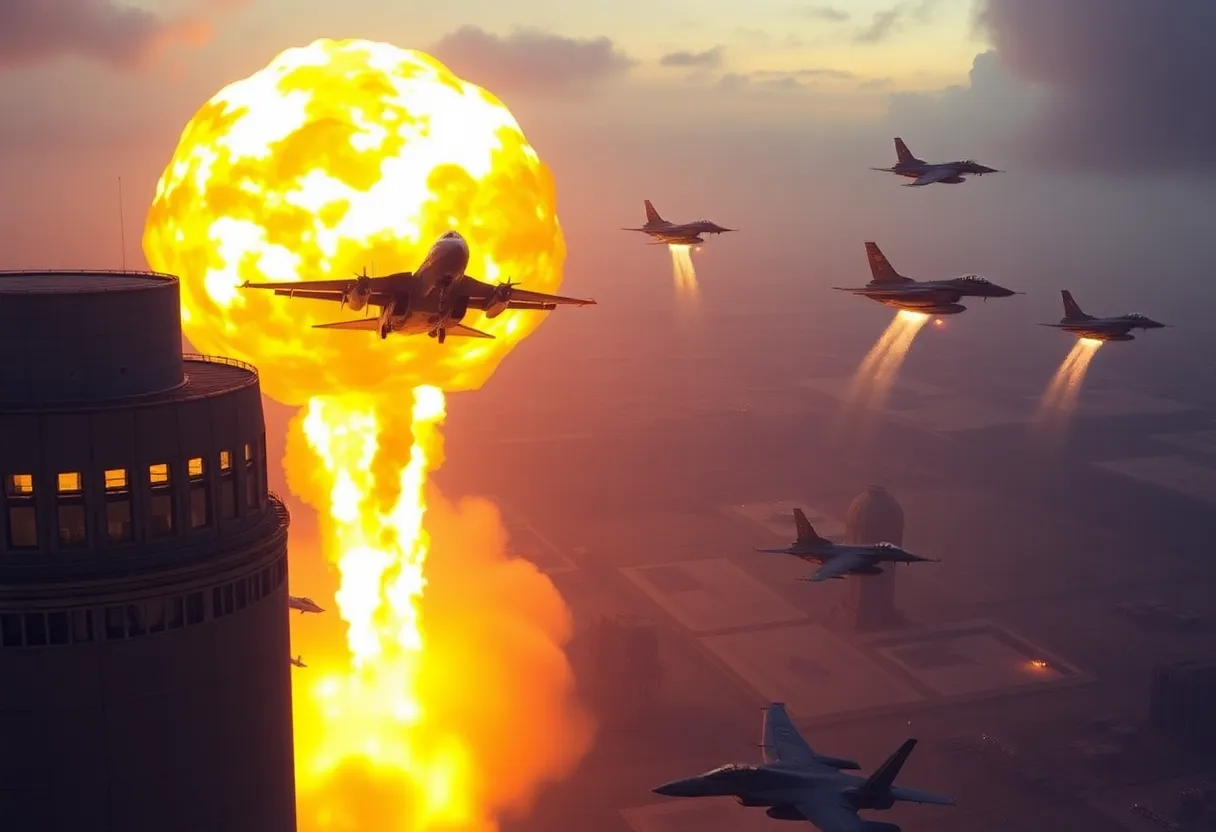News Summary
President Donald Trump has reaffirmed his claims of successful U.S. airstrikes against Iranian nuclear sites, challenging reports from intelligence agencies that dispute the effectiveness of these military actions. Despite skepticism and concerns raised by the International Atomic Energy Agency regarding the extent of damage to facilities like Fordow, Trump insists the strikes were decisive. Political reactions have been mixed, with some lawmakers recognizing damage while others stress that military means cannot eliminate a nation’s nuclear knowledge. As tensions rise, discussions on a potential nuclear deal remain complex.
Trump Stands Firm on Claims of Successful Strikes Against Iranian Nuclear Facilities
The ongoing tensions between the United States and Iran have recently intensified, especially in light of President Donald Trump’s assertions regarding the effectiveness of U.S. airstrikes on Iranian nuclear sites. In a series of statements, he has vehemently denied reports suggesting that these strikes did not fully destroy Iran’s nuclear capabilities.
Conflicting Claims and Reports
Following a 12-day conflict involving Israel and Iran, President Trump reiterated his commitment to preventing Iran from acquiring nuclear weapons. Despite claims from intelligence agencies, including the CIA and the United Nations, indicating that Iran was not actively pursuing a nuclear arsenal, Trump remains steadfast in his belief that the military actions taken by the U.S. were decisive.
In a recent interview, Trump pointed out that prior to Israeli strikes on June 13, Iran was merely “weeks away” from developing nuclear weapons. Nine days after those Swiss military actions, U.S. forces targeted three prominent Iranian nuclear facilities: Fordow, Natanz, and Isfahan.
The Damage Done?
Trump has boldly claimed that the airstrikes “obliterated” the targeted nuclear sites, insisting that they were rendered ineffective for a significant period. However, multiple news organizations have voiced skepticism, suggesting that intelligence reports indicate the strikes did not fully destroy these critical facilities.
One area of concern has been the Fordow plant. The International Atomic Energy Agency (IAEA) stated that it remains unclear just how much damage was inflicted during the airstrikes. IAEA Chief Rafael Grossi noted that Iran could easily resume uranium enrichment within mere months if given the opportunity.
The Reality on the Ground
According to IAEA reports, Iran currently possesses over 400kg of uranium enriched to nearly 60%, a level that is perilously close to what would be considered weapons-grade. While the Iranian government maintains that their nuclear program is solely for civilian purposes, these developments have raised alarms in the international community.
Trump criticized news organizations challenging his accounts of the strikes as spreading “fake news.” He dismissed claims that Iran had removed enriched uranium from Fordow prior to the airstrikes, asserting that the U.S. military succeeded in penetrating the facility, despite its mountainous location.
Political Reactions and Divisions
As discussions surrounding the effectiveness of these airstrikes unfold, U.S. lawmakers appear to be divided on the overall impact of the military actions. While some acknowledge that damage was indeed inflicted, others, including Senator Chris Murphy, have argued that one cannot fundamentally eliminate knowledge of nuclear technology through military means.
Senator Lindsey Graham pointed out that, despite the damage caused, the underlying desire for nuclear capabilities still exists within Iran. Grossi, from the IAEA, has emphasized the sophistication of Iran’s nuclear program and called for a robust inspection system in any future negotiations.
Prospects for a Nuclear Deal
Looking forward, Trump hinted at a potential meeting to discuss a nuclear deal with Iran. However, Iran’s foreign minister has denied that any such discussions are in the works, adding another layer of complexity to the situation. Tensions have only grown as the conflict involved Israel’s military campaign against Iranian targets, culminating in the U.S. intervention.
Ultimately, Trump’s unwavering claims raise questions about the clarity of future diplomatic efforts with Iran. With contrasting views from intelligence agencies and political figures, the U.S. must tread carefully as it navigates this unpredictable landscape.
Deeper Dive: News & Info About This Topic
- The Washington Post
- The New York Times
- Al Jazeera
- USA Today
- Politico
- Wikipedia: Iran Nuclear Program
- Google Search: Trump Iran Nuclear Strikes
- Google Scholar: Iran Nuclear Program
- Encyclopedia Britannica: Iran 2023
- Google News: Nuclear Iran

Author: STAFF HERE FLORENCE WRITER
The FLORENCE STAFF WRITER represents the experienced team at HEREFlorence.com, your go-to source for actionable local news and information in Florence, Florence County, and beyond. Specializing in "news you can use," we cover essential topics like product reviews for personal and business needs, local business directories, politics, real estate trends, neighborhood insights, and state news affecting the area—with deep expertise drawn from years of dedicated reporting and strong community input, including local press releases and business updates. We deliver top reporting on high-value events such as the Florence Festival of Lights, Pee Dee Pride, and agricultural expos at the Florence Center. Our coverage extends to key organizations like the Florence Regional Chamber of Commerce and the Pee Dee Area Council of Governments, plus leading businesses in healthcare and retail that power the local economy such as McLeod Health and Pee Dee Electric Cooperative. As part of the broader HERE network, including HERECharleston.com, HEREColumbia.com, HEREGreenville.com, and HEREHiltonHead.com, we provide comprehensive, credible insights into South Carolina's dynamic landscape.





